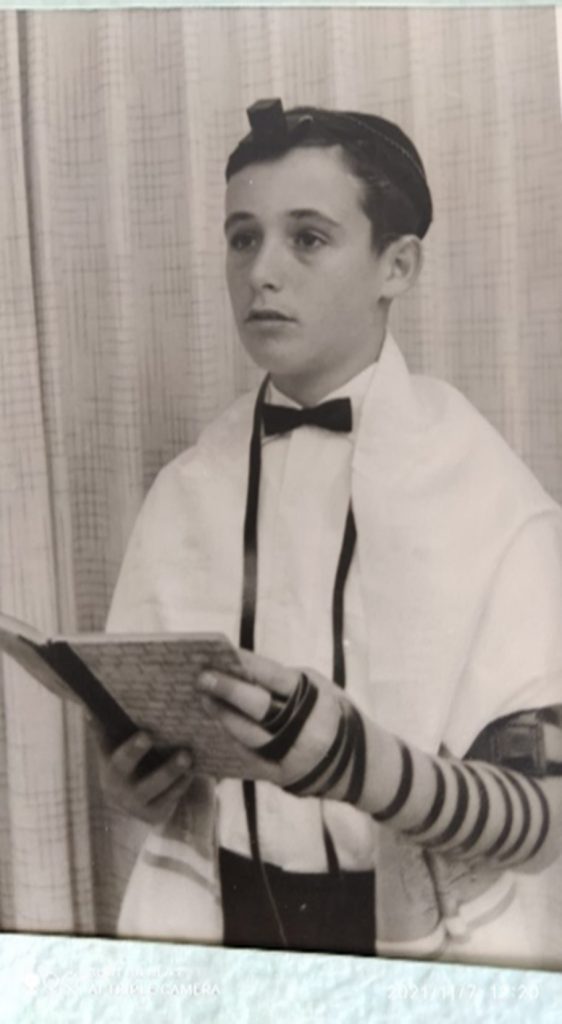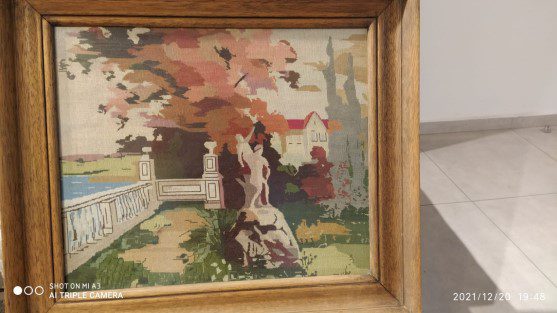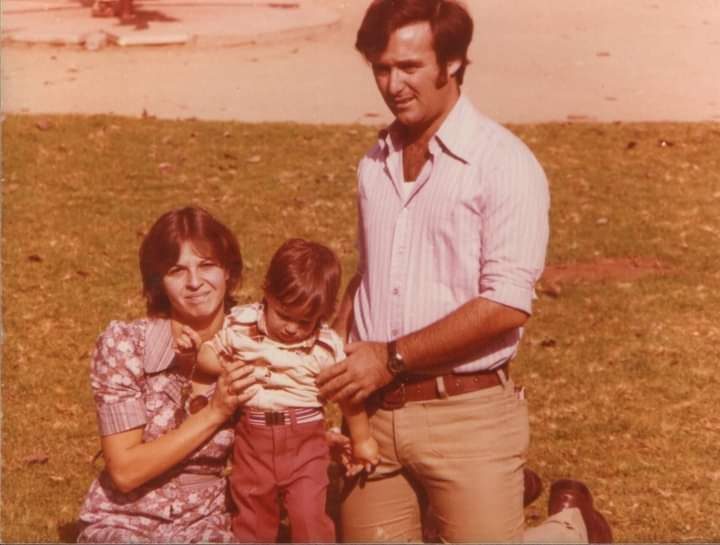My Grandfather's Interesting Life
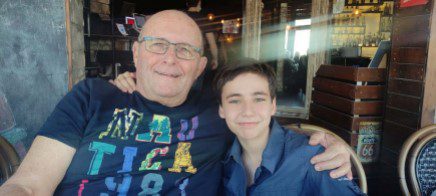
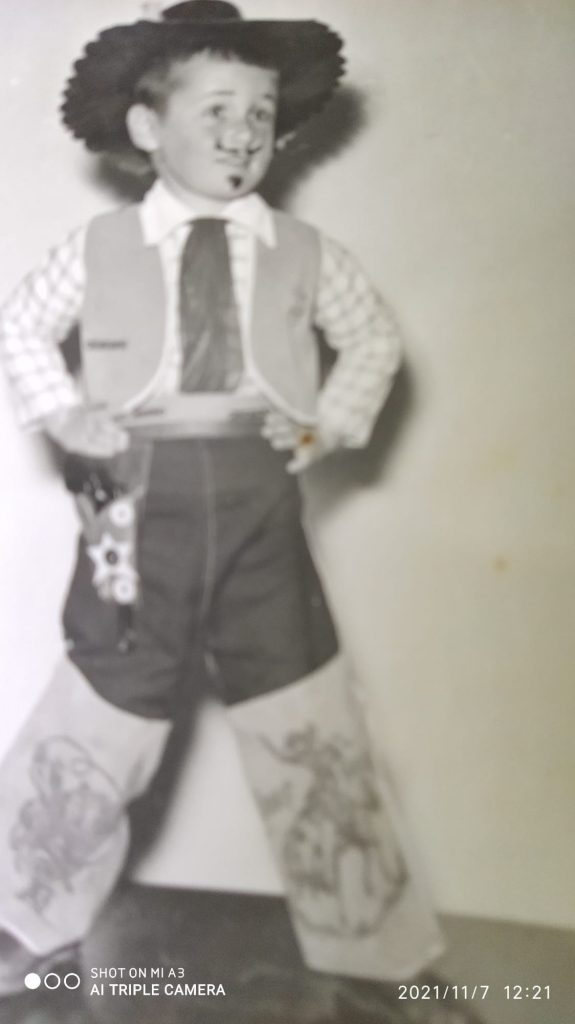
Description of the picture:
I chose this picture of my grandpa because in the picture he had a Bar-Mitzvah and I also had a Bar-Mitzvah, lately.
The picture was taken by a special photographer, in a photo studio, in Tel-Aviv, in 1965. In the picture, I can see my grandpa Baruch, with Tefillin, on his hand and forehead, which is one of the most iconic Bar-Mitzvah signs.
My grandpa wears a white elegant shirt, a Tallit, and holds a Bible book. In the back of the picture, I noticed only the year it was taken, and no other info.
The Story about My grandpa's favorite dish:
My grandfather told me that his favorite dish is Tshulnt. Tshulnt is a traditional Jewish stew dish. Its color is brown (the meat paints all the ingredients in brown), with many different textures. It tastes like a stew that was cooked for a long time, and it smells like cooked meat and onion.
My grandfather told me that his father used to make Tshulnt. "My dad (Tavor's grand-grandfather) prepared this dish, usually at weekends, in the wintertime.
During the week, my father sent me to buy some meat at the butcher's shop. It was far from our home, and I had to ride my bicycle to get there. All other ingredients were already at home.
On Friday morning, my mother took all the fat of the meat, cut it into small cubes, washed the beans and the groats, and added potatoes and onion. She also added "Helzale" – a chicken throat skin, filled with fat, onion, wheat and eggs, that was stitched with a thread, to avoid the ingredients from falling out, from the Helzale. She put all the ingredients in a pot and added water.
In the afternoon, my dad came home and set the fire in the oil burner, and it worked till Saturday noon. The smell of the Tshulnt was unforgettable. During the morning, my father tasted the Tshulnt, and we all joined him, when it was ready."
A saying that my grandfather often says, is "yemei hatom", the days of the innocence, when everything (food, clothes, toys…) was simple and modest, because they haven't had something else. Everyone was wearing khaki pants and a blue shirt, or vice versa, and a bucket hat.
I asked my grandfather what he feels when he sees tshulnt, and he answered me that he remembers a different period, when the life was simple, and the food was tasty and simple. He also mentioned that even he prepared the dish lot of times, it was never as good as his father's tshulnt.
A Thing That My Grandpa Keeps:
A thing that my grandpa keeps, is a handmade embroidered image, that was made with a very thin sewing thread, by my grandma's mom in 1925. He keeps it, because he sees it as a souvenir from his mother-in-law. He also said to me a phrase: "the things that we left in the end- pictures and memories".
My Grandpa's Childhood
I asked my grandfather about his childhood, and that is the story:
"My childhood was beautiful and simple. I grew up in the new neighborhood in Herzliya B, which was pretty much a kibbutz, because only 26 families that lived in a two-family house were living there. There wasn’t any fence between the houses. You could walk from one garden to another and meet your friends. During the day all the doors were open, and nobody was scared from a thief or a burglar. The parents locked the door only at night. My grandpa also told me that the only quality time with my parents was Friday evening Shabbat meal. His parents were Holocaust survivors, and they never talked too much, or more than needed." My grandpa also said: "I never complained about my childhood."
"The friends from the neighborhood were all around the same age, and we played a lot of games that mostly aren’t popular today. but the game that me and my friends were playing the most, was definitely football. We used to play it on the road that wasn’t paved.
My hobbies were hiking, going to the beach, playing some sports and enjoying with my friends. I also liked aviation. I was in the Kluv Hateufa (a club where you learned how to build gliders and learn the mechanics, a thing that very helped me when I was in the military, because I was an aircraft technician). The friendships were more real, because we talked face to face and didn’t talk on the phone.
We also used to walk barefoot, and just found ways to cool our feet, like walking on grass and weeds. The fact that our neighborhood was 500-700 meters from the beach, made it our most visited attraction. In the house, until the age of 4, I was speaking only Yiddish.
I am very proud to be a Yiddish speaker, and to be a descendant of a family of Holocaust survivors. My dad's family was murdered in the holocaust, and my mom's family made Aliya.
I cannot write in Yiddish, but I can read it. I even participate twice a week in a Yiddish class, and I like to watch musicals in Yiddish.
I think it is very important to keep and save and speak this language, because it is an extinct language, even though academic institutions began to teach the Yiddish language. I also know German because it is very close to Yiddish, and also because I heard it at home, and my mother-in-law talked to me in German."
My Grandfather’s School Years:
I asked my grandfather to tell me the interesting story about his school, and he told me this: "I studied in Brandeis elementary school in Herzliya for 8 years, from the first grade to the eighth grade. The school was located in Herzliya B, pretty close to my house.
we had a few important school rules: Every day, at 8:00, all the students came to "Mifkad" (census). The manager greeted everyone, and all the students replied to him with a blessing. He then read a chapter in the Torah and separated them to the classes.
I don’t remember any violence in school, except for a very few times. When the teacher entered the class, we all stood up. There was a lot of respect for the teachers from the students.
We learned the same subjects as today, but more extensively. When my class started to learn English, I was in fourth grade, and I took private lessons before, so I always knew better than my class, and was in the first grouping. The teacher's attitude was tough, because they had high expectations.
The first 4 grades finished learning at 12:00 every day while the other classes finished at 14:00.
The main activities were on the break, when we played football, hockey, and catches. There wasn’t any uniform, but everybody was dressed the same, with blue pants and a khaki shirt, or vice versa.
The punishments were standing in the corner of the class, or copying a paragraph from the bible, memorizing and reciting it.
There wasn't any encouragement for the students themselves, but only a massive encouragement for reading books. There was even a competition for the student who read the most books. I read 3 books in a week, and I was really a bookworm.
My favorite teacher was my first teacher, Malka. She was my educator for 4 years. She got us on our feet. She was teaching us Hebrew and the Hebrew alphabet, and basic concepts in math. Later, I got a different teacher every year. I remember happy and simple days".
I think that my grandfather's school was very different from our school, because the level of the education and the discipline to the teachers was higher. There wasn’t any relief or shortcuts, and the students were a lot more determined and calmer.
we learn today many similar subjects as my grandpa did. Actually, there are a lot of similarities that I didn't know. like the fact that they also stood up when the teacher entered the class, and also, the time that they were finishing studying was around the same time as us.
This part of the multi-generational connection root work made me wonder how different life actually was in different subjects, when my grandfather was a kid at my age.
I am very happy to hear that my grandfather was an excellent student, and as he is saying to me: "the genes are good in our family"
הזוית האישית
How was the work process? What do we wish to each other?
Baruch: the work process was productive, effective, I was complied with your requests, because I know it will serve you. I wish you that you will grow up, and as we say in Yiddish, be "mensh", which means be a good person.
Tavor: I really enjoyed during the work process, and I think it was very special and productive. I even learn some new things about my grandpa!
מילון
גןגֵּן הוא יחידת מידע המועברת מאורגניזם לצאצאיו באמצעות החומר התורשתי (לרוב DNA
ציטוטים
”When the teacher entered the class, we all stood up. “






